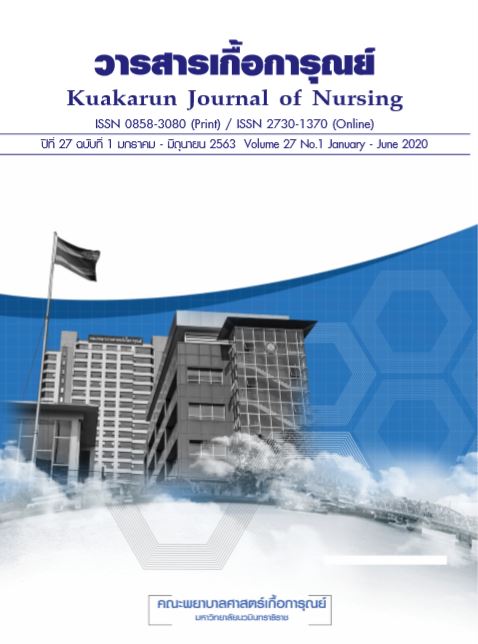กลยุทธ์ในการเสริมสร้างพลังอำนาจผู้ดูแลผู้ที่บาดเจ็บไขสันหลัง
คำสำคัญ:
การเสริมสร้างพลังอำนาจ, การสนับสนุนผู้ดูแล, ผู้บาดเจ็บไขสันหลังบทคัดย่อ
ผู้ที่บาดเจ็บไขสันหลังรุนแรงมักเป็นผู้ป่วยที่ไม่สามารถช่วยเหลือตัวเองได้ และกลายเป็น ผู้ป่วยเรื้อรังที่ต้องได้รับการดูแลตลอดเวลา ผู้ดูแลในครอบครัวต้องให้การดูแลที่ต่อเนื่องเมื่อผู้ป่วย ถูกจำหน่ายออกจากโรงพยาบาล ภาระการดูแลไม่ได้จำกัดอยู่เพียงการดูแลด้านร่างกายเท่านั้น แต่ยังต้อง ครอบคลุมไปถึงการดูแลตามความต้องการด้านอารมณ์จิตใจ และด้านสังคมด้วย ในขณะเดียวกันผู้ดูแล ก็ต้องรักษาสมดุลระหว่างการดูแลผู้ป่วยกับการจัดการกิจกรรมในชีวิตของตนเองด้วย ซึ่งหากผู้ดูแล มีความสามารถในการจัดการสถานการณ์ดังกล่าวได้ไม่เพียงพอ จะส่งผลกระทบต่อความสามารถ ในการดูแลผู้ป่วยและการดำเนินชีวิตของผู้ดูแล ด้วยเหตุนี้การเสริมสร้างพลังอำนาจสำหรับผู้ดูแลจึงมี ความจำเป็น ในการสนับสนุนให้ผู้ดูแลมีความสามารถในการดูแลผู้ป่วยได้อย่างมีประสิทธิภาพ พยาบาล สามารถสนับสนุนผู้ดูแลให้มีความสามารถในการจัดการทั้งการดูแลผู้ป่วยและความสามารถในการจัดการ กับสถานการณ์ชีวิตของผู้ดูแลได้ โดยใช้ 11 กลยุทธ์ในการเสริมสร้างพลังอำนาจ ได้แก่ การจัดบรรยากาศ และสภาพแวดล้อมให้เหมาะสม การสร้างและคงไว้ซึ่งสัมพันธภาพที่ดี การยอมรับในความเป็นบุคคล การใช้คำถามสะท้อนคิด การสนับสนุนด้านความรู้และข้อมูล การเสนอทางเลือกที่เป็นไปได้ การให้ คำปรึกษา การเสนอกรณีตัวอย่าง การสนับสนุนด้านการปฏิบัติ การให้ข้อมูลสะท้อนกลับ และการสรุป ประเด็น ซึ่งกลยุทธ์เหล่านี้จะส่งเสริมให้ผู้ดูแลมีพลังอำนาจในตัวเอง สามารถดูแลผู้ที่บาดเจ็บไขสันหลัง ได้อย่างมีประสิทธิภาพและมีคุณภาพชีวิตที่ดีขึ้น
เอกสารอ้างอิง
Post MW, Adriaansen JJ, Charlifue S, Biering-Sorensen F, van Asbeck FW. Good validity of the international spinal cord injury quality of life basic data set. Spinal Cord 2016;54(4):314-8.
Vagharseyyedin SA, Molazem Z. Burden, resilience, and happiness in family caregivers of spinal cord injured patients. Middle East Journal of Psychiatry & Alzheimers 2013;4(1):29-35.
Rabeh SAN, Caliri MHL, Dantas RAS. Health-related quality of life among caregivers of Individuals with spinal cord injury. Journal of Neuroscience Nursing 2016;48(1):28-34.
Jitprasert T. Empowering caregivers of persons with spinal cord injury: a case study [Dissertation]. Chiang Mai: Chiang Mai University; 2018. (in Thai)
Gibson CH. The process of empowerment in mothers of chronically ill children. Journal of Advanced Nursing (Wiley-Blackwell) 1995;21(6):1201-10.
Kirshblum SC, Burns SP, Biering-Sorensen F, Donovan W, Graves DE, Jha A, et al. International standards for neurological classification of spinal cord injury (Revised 2011). The Journal of Spinal Cord Medicine 2011;34(6):535-46.
Vaccaro AR, Fehlings M, Dvorak MF. Spine and spinal cord trauma: evidence-based management [Internet]. 2011 [cited 2017 Jul 20]. Available from: http://www.apparelyzed.com/spinal_cord_injury.html
Mueanchoo S, Keeratiyutawong P, Wachirawut W. Predictive factors in stress-coping ability of caregivers of spinal cord injury patients. Journal Thailand Nursing and Midwifery Council 2016;31(1):124-36. (in Thai)
Dajpratham P, Kongkasuwan R. Quality of life among the traumatic spinal cord injured patients. Journal of The Medical Association of Thailand 2011;94(10):1252-9. (in Thai)
Ratanasiri S. Nursing for spinal cord injury [Internet]. [cited 2017 Jul 22]. Available from: https://w2.med.cmu.ac.th/northo/index.php?option=com_content&view=article&id=47:spinal-cord-injury-nursing-care&catid=22:orthopedics-nursing&Itemid=227 (in Thai)
Zandrow. Advice for caregivers of spinal cord injury [Internet]. [cited 2018 Apr 20]. Available from: http://wiki.legalexaminer.com/help-center/articles/advice-for-caregivers-of-spinal-cord-injuries.aspx
Chaophanon W, Phasukhantaphak N, Norasarn S. Guidelines for nursing of spine surgery patients (Nurses) [Internet]. 2008 [cited 2017 Jul 15]. Available from: http://pni.go.th/cpg/backbone-2008.pdf (in Thai)
Bickenbach J, Officer A, Shakespeare T, Groote P. International perspectives on spinal cordinjury. Geneva: World Health Organization; 2013.
Graca A, Nascimento MA, Lavado EL, Garanhani MR. Quality of life of primary caregiversofspinal cord injury survivors. Revista Brasileira de Enfermagem 2013;66(1):79-84.
Ebrahimzadeh MH, Shojaee BS, Golhasani-Keshtan F, Moharari F, Kachooei AR, Fattahi AS. Depression, anxiety and quality of life in caregiver spouses of veterans with chronic spinal cordinjury. Iranian Journal of Psychiatry 2014;9(3):133-6.
Gibson CH. A study of empowerment in mother of chronically ill children [Dissertation]. Boston College: Submitted to Dept. of Nursing; 1993.
Bakhshi F, Shojaeizadeh D, Sadeghi R, Taghdisi MH, Nedjat S. The relationship between individual empowerment and health-promoting lifestyle among women NGOs in northern Iran. Electron Physician 2017;9(2):3690-8.
Higginbotham J. Using reflective questions to empower parents-a table talk Wednesday recap [Internet]. 2015 [cited 2017 Jun 17]. Availablefrom: http://www.eiexcellence.org/using-reflective-questions-to-empower-parents-a-table-talk-wednesday-recap/
Gibson CH. A concept analysis of empowerment. Journal of Advanced Nursing 1991;16(3):354-61.
Judy K. Self-observation: an empowerment strategy in assessment. Social Casework 1989;70(5):276-84.

















